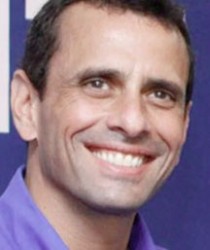CARACAS, (Reuters) – A flagship Venezuelan TV channel known for its militant opposition to late socialist leader Hugo Chavez has toned down under new owners, depriving the opposition of a favored platform as it fights a new government.
During Chavez’s tumultuous 14-year rule, Globovision played a controversial and high-profile role: it was derided by officials as a pro-U.S., law-breaking broadcaster but feted in the opposition as a beacon of free speech.
Its majority owner, businessman Guillermo Zuloaga, who lives in exile in the United States, sold the station this month. The new bosses have made immediate changes, including stopping live broadcasts of opposition leader Henrique Capriles.
“I was told that the new directors gave an order not to show me live,” Capriles said on Twitter this week, arguing the buyers were stooges of recently elected President Nicolas Maduro’s government.

“My eternal gratitude to the Globovision workers for having provided a window to speak to our people,” added Capriles, who lost last month’s presidential election to Maduro by 1.5 percentage points but is disputing the result.
Globovision, now owned by three little-known businessmen who are also shareholders of a local insurance company, has denied accusations by some disgruntled workers at the broadcaster that it was kowtowing to the government.
“The board of directors has not banned any official or political leader from Globovision,” Globovision said in a statement. “On the contrary, the editorial policy consists in broadening the line of information and opinion to all voices in the country, without any discrimination.”
Still, various high-profile contributors, including opposition politician Ismael Garcia, who had a Sunday program, and anchor Francisco “Kico” Bautista, who became a household face of “anti-Chavismo,” are now gone.
Though private TV stations were openly anti-Chavez at the start of his tenure, including during a brief 2002 coup against him, one broadcaster later lost its licence and others became more moderate in their public programming.
So Globovision had been an outlying, aggressive voice for the opposition on television. Its premises were attacked several times, and it faced a battery of legal charges and a multi-million dollar fine over its coverage of jail violence.
OPPOSITION
TURN TO TWITTER
Strident opposition to Chavez, and now to his successor Maduro, has continued among a plethora of newspapers and radio stations. One paper, for example, recently ran a front page picture of Maduro mocked up as Hitler.
On the other side, a huge array of state media defend the government and vilify Capriles as a fascist.
Some government officials have been rubbing their hands in glee over developments at Globovision, which was a constant thorn in their side, though it did also provide a useful argument against criticism they were crushing free speech.
“They sold because they ran out of money – they used the station as a political party,” scoffed Diosdado Cabello, the powerful vice-president of the ruling Socialist Party.
Anti-government activists, glued to Globovision for years, are quickly turning to other venues such as webcasts of Capriles events.
Capriles also reaches a huge audience via Twitter: his 3.4 million following is the largest of any other Latin American politician, including heads of state. In fact, only the deceased Chavez beats him, with 4.2 million followers still.
“While it is tempting to be frightened by Globovision’s demise, it’s possible that we may not need it in the end,” wrote pro-opposition blogger Juan Cristobal Nagel.




